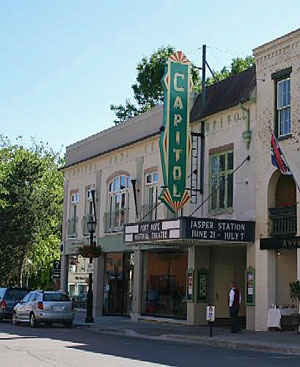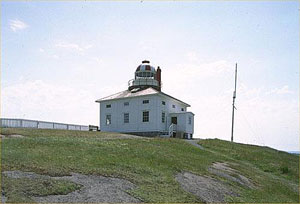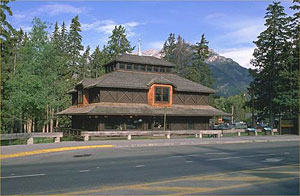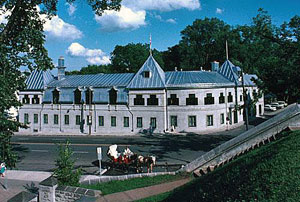Heritage Tourism
According to the World Trade Organization, there is currently a
shift away from active holidays and towards experiential
vacations. Modern travelers prefer tourist attractions that
provide educational opportunities. Fortunately, the Canadian
Register of Historic Places is filled with historic places that
offer a combination of learning and leisure. Destination
options not only include museums and interpretive centres, but also
heritage buildings and cultural landscapes. Often referred to
as Heritage Tourism Enthusiasts, many tourists seek out heritage
sites during their travels. Since Canada has a vast
collection of historic places, tourists have limitless choices!
Tourism stimulates the Canadian economy. In 2010,
overnight travel spending brought in $3 billion - a noteworthy
figure! Statistically, Heritage tourist enthusiasts tend to
spend more money per day and stay longer, especially since the
average income of heritage tourism enthusiasts is notably higher
than other habitual tourists. Although Americans make up the
majority of self-identified heritage enthusiasts that travel to
Canada, a significant amount of international tourists interested
in our historic places also visit from Europe and Asia. 2.6
million Canadians identify themselves as heritage enthusiasts and
are attracted Canada's unique historic places. In fact, 55%
of this group ensure that they include Canada's historic places in
their travel plans. Some historic places have, of course,
figured this out!
For example, Port Hope - a mid-sized city in Ontario - has
experienced first-hand the benefits of heritage tourism.
After an extensive restoration project in the 1970s, the downtown
area now features specialty shops and antique stores. Now a
magnet for visitors, tourism is one of the fastest-growing
industries in the area. Heritage buildings such as the
Port Hope Capitol Theatre are attracting
new clients from across their region. Designed to make
patrons feel as though they are inside a medieval castle, the
atmospheric theatre includes has frescoed ceilings and walls
depicting natural scenes, and a brenograph projector which projects
images of stars and clouds to create the atmosphere of a summer's
evening. Restorations like that of the Port Hope
Capitol Theatre draw external guests to the local area and
support the entire municipality. Now, Port Hope and its
historic places is a day trip away for over 2.5 million
Torontonians.
 The most easterly point in Canada, Cape
Spear, attracts tourists from Canada and abroad every season.
Cape Spear is marked by Cape Spear Lighthouse NHS: this
lighthouse stands on a high bluff, was constructed in 1835, and is
an icon of Newfoundland pride. Tourists are drawn by its age
and location, for there is a stunning view of the surging Atlantic
Ocean and St. John's harbour. Here, heritage enthusiasts can
understand Canada's rich maritime history.
The most easterly point in Canada, Cape
Spear, attracts tourists from Canada and abroad every season.
Cape Spear is marked by Cape Spear Lighthouse NHS: this
lighthouse stands on a high bluff, was constructed in 1835, and is
an icon of Newfoundland pride. Tourists are drawn by its age
and location, for there is a stunning view of the surging Atlantic
Ocean and St. John's harbour. Here, heritage enthusiasts can
understand Canada's rich maritime history.
Canada's first national park, Banff, is world renowned as a
popular tourist destination. Originally built when the
national park was part of the Rocky Mountains Park, its Museum of Natural History NHS is the
oldest surviving building constructed by the
federal government in the area. Built in 1895, and moved in
1903, this local landmark is representative of an early approach of
the interpretation of natural history in Canada. The building's
design is typical of the rustic architecture seen throughout
Banff. Also known as "the Switzerland of the Americas", the
town of Banff is one of the most visited towns in Canada.
Why? It's richness of historic places in the majestic
mountains draw people from around the world.
surviving building constructed by the
federal government in the area. Built in 1895, and moved in
1903, this local landmark is representative of an early approach of
the interpretation of natural history in Canada. The building's
design is typical of the rustic architecture seen throughout
Banff. Also known as "the Switzerland of the Americas", the
town of Banff is one of the most visited towns in Canada.
Why? It's richness of historic places in the majestic
mountains draw people from around the world.
For American tourists, approximately one third incorporate
Québec's historic places in their itineraries. Québec's
strong heritage conservation strategies combined with the old world
architecture of Québec City and Old Montréal, have kept American
tourists coming for a century. One of the most visited sites
in Old Québec City is the Québec Garrison Club NHS. The
mansion demonstrates a modified château style with beautiful
gardens. As one of Québec City's oldest private clubs, this
dignified historic place appeals to all tourists, captivated by its
architecture.
It is economically beneficial for Canada when travellers visit
historic places. It allows Canadians to showcase their
rich history to the world while benefitting from tourist
dreams. The current trend towards more experiential holidays
is an opportunity for Canadians to encourage local and
international travellers to visit to historic places in their
neighbourhood or across the country. With a vast range of
place on the Canadian Register of Historic Places, Canada can be
proud. Perhaps your next family vacation will involve one of
Canada's many historic places.